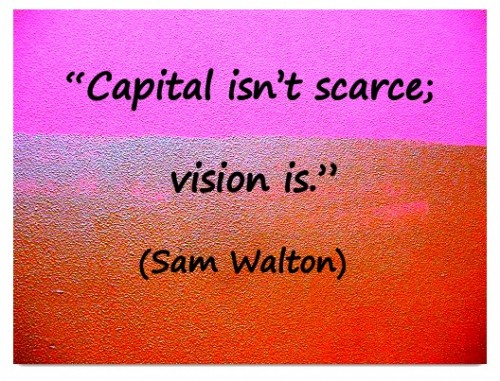Coaching Quote of the Day 4th November 2012

“Capital isn’t scarce; vision is”
(Sam Walton)
What thoughts does this quote provoke?
Could you imagine using it in a coaching session, and if so how?

“Capital isn’t scarce; vision is”
(Sam Walton)
What thoughts does this quote provoke?
Could you imagine using it in a coaching session, and if so how?
Robert Boyd draws upon over 25 years worth of business experience to share his experlise and knowledge in today’s guest post.

by Robert Boyd
What was I thinking?
This thought surely crosses every entrepreneur’s mind in the business start-up frenzy, and intensifies and reverberates after the shingle’s been hung and the last business card’s been carefully arranged in its holder.
Many business owners don’t have a business degree, and some don’t have much experience. Tired of 60-hour work weeks for mediocre pay, many employees swap an ID badge for a DBA. But as time ensues, few escape the letdown of seemingly side-stepped dreams. Even fewer escape the knock back to reality. In fact, most new businesses fail. According to the Small Business Administration, only five percent survive beyond the five-year mark. Business experts tout practical reasons for failure, such as poor planning, wrong location, insufficient capital, overexpansion and the inability to stay current with technology. Some even say starting a business for the wrong reason breeds failure. Whatever the cause, fantasies of hundred dollar bills and weekday afternoons in the movie theater dim as exhaustion and reality take root.
Let’s use an example: A transition from a solo psychology practice into a wellness center that offers varied services like nutrition, massage and counseling. Visions of dollar signs and one free Saturday a month jump in the owner’s head. She hires. She gets checks. She fires. She writes checks. She’s tired. She begins thinking that maybe life wasn’t as bad as it was. She wonders what she was thinking.
What were you thinking? What were you thinking? What were you thinking? Why did you shift?
Money and freedom are fine values, and while we may indeed value them for material gain, money often symbolizes deeper values. The truth is, we can make money doing absolutely anything: Selling hot dogs at the beach. Working at the home store. Building skyscrapers. Walking labradoodles. So why this?
A closer look reveals that in the example, under our business endeavor lays the business owner’s personal values. Self-reliance, freedom of choice and equality are fully expressed in the expanded center through the nature of the service (self reliance), the varied services (freedom of choice) and by combining stigmatized counseling services with mainstream, well-accepted services (equality), while only one was expressed in the solo practice (self-reliance). And in this example, the value of money actually came to mean security and freedom, not just money for the sake of having it.
Exercise: Google “values list”. Print it out. Scan it visually and narrow it to fifteen concepts that you value and that guide your actions. Then trim it to five, then three. Entrepreneur or not, determine how your business endeavor expresses each of these values. This may require some reflection, but is an exercise well worth doing.
Our values guide us in both daily decisions and in life-changing choices, including professional success. Reminding ourselves of our ‘why’ pulls us forward when a venture starts to sour or stall. It’s easy to lose sight of your vision with those debt and stress-induced blind spots.
Values infuse passion when little else sustains us. Doing business without them generates the ordinary. Values birth vision. Be extraordinary—in business and in life.
Robert Boyd, Managing Director of SportsEquip and an expert in the equipment & surfaces used by elite sportsmen & athletes. Robert has been in the industry for over 25 years providing football goals, tennis nets & cricket equipment to schools, clubs & the general public.
Image above title © Atrocity | Stock Free Images & Dreamstime Stock Photos
“Everything depends upon execution; having just a vision is no solution.”
(Stephen Sondheim)
“Vision without action is merely a dream. Action without vision just passes the time. Vision with action can change the world.”
(Joel Arthor Barker)
As a student I worked part time in a coffee shop and café. One of the very things I remember being encouraged by the manager is to look busy, just in case the owner arrived. This meant that we would often be doing things just for the sake of doing stuff and looking busy.
While the individuals involved may have changed over time I found that wasn’t the first role where looking busy was encouraged.
The thing with being busy is that you are often taking lots of action – it just isn’t necessarily action that is moving you forward. So returning to my question at the start of this post, as a coach how busy are you?
Is the action you are taking actually moving you closer to where you want your coaching practice to be? Or is it action you’re taking because you think you “should” or because it’s what everyone else does etc?
When you are coaching clients you may be really good at assisting them to choose action steps that will make the biggest difference to them. You may have a whole selection of techniques, theories and methods that you use to be able to do that but do you walk your own talk?
It’s January so it’s entirely possible that you have recently created a vision about where you want your coaching practice to go in 2011 and beyond. You may also have devised a plan to get there.
It’s entirely possible that you have restricted time to work on building your coaching practice. I also know that sometimes it can feel like “real life” can get in the way. For instance, I know many coaches and trainee coaches work either part or full time doing other jobs.
Have a look at any to-do lists or schedules you have to do with your coaching practice, how much of what is on there actually moves you towards what you want your coaching practice to become?
As Joel Arthur Barker said:
“Vision without action is merely a dream. Action without vision just passes the time. Vision with action can change the world.”
If you think you need support to take more focused action, I’ll be running a Turbo Boost week at the start of February. You can find the full details of what is involved, including how you can reserve your place, here.